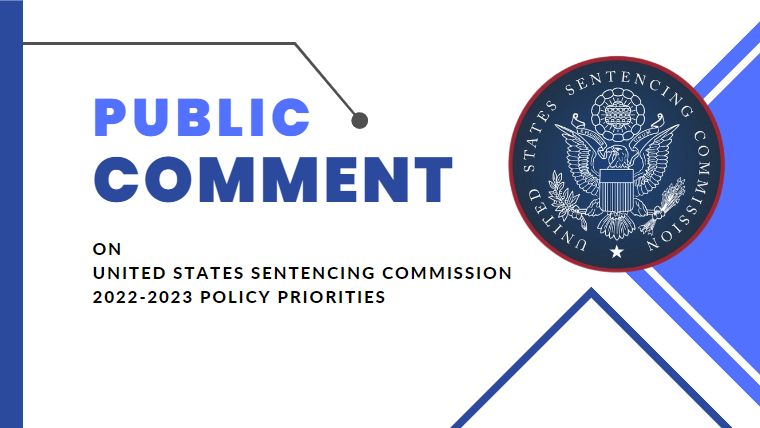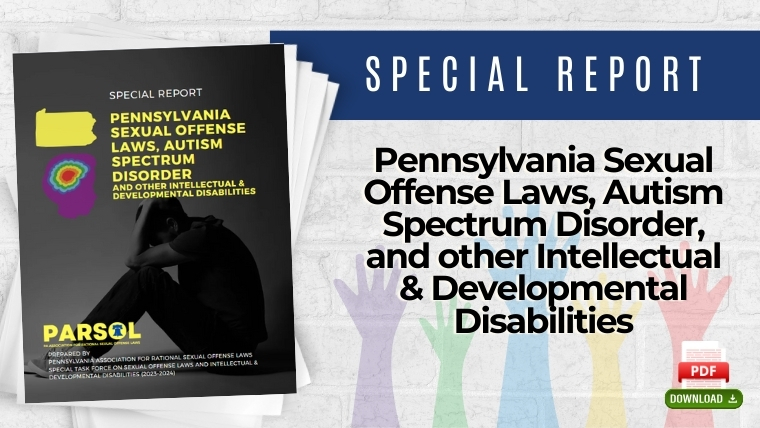On Thursday, September 29, 2022, the newly re-constituted United States Sentencing Commission issued tentative policy priorities for the 2022-2023 amendment year—with top focus on implementation of the First Step Act of 2018. A brief public comment period followed during which the following comments were submitted by “John F.” as reported by NARSOL. They are posted here for your information.
The United States Sentencing Commission, an independent agency in the judicial branch of the federal government, was organized in 1985 to develop a national sentencing policy for the federal courts. The resulting sentencing guidelines provide structure for the courts’ sentencing discretion to help ensure that similar offenders who commit similar offenses receive similar sentences.
2022 Sentencing Commission Public Comment
These public comments are in reference to 18 U.S.C. Section 2252(a)(2) and 18 U.S.C. Section 2252(b)(2) (Distribution of child pornography).
The current sentencing structure for any violation of 18 USC 2252(a)(2) and (b)(2) is a 5-year mandatory minimum and 20-year maximum sentence for first time conviction and 15-year minimum and 40-year maximum for second time conviction.
First, the sentences for these statutes do not involve production or physical contact with a minor and are overly punitive. Secondly, the sentences should be based on the convicted person’s specific aggravating or mitigating circumstances, criminal history, amenability for rehabilitation and correction, and nature of the offense. The charge of distribution makes no distinction between the nature and quantity of materials distributed and if the materials distributed already existed on the (electronic) platform they were distributed on. For example: a person who distributes 500 files on a file sharing program may face the same 5-year mandatory minimum sentence as a person who distributes 1 file in a social media platform. Based on the sheer number of materials being distributed online every month, the 5-year mandatory minimum sentence is not promoting respect for the law and it is only speculation that harsher, longer mandatory minimum terms would promote respect that is currently lacking.
The mandatory minimum sentences for 18 USC 2252(a)(2) and (b)(2) prevent judges from sentencing the person based on the totality of their individuality, life history and mitigating or aggravating circumstances. The majority of those convicted are first time offenders of ANY CRIME and are otherwise law-abiding citizens. To automatically send these citizens to a harsh imprisonment without any redress by the magistrate borders on cruel and unusual punishment, an 8th amendment violation.
The sentencing commission has no background in understanding the psychology behind sexual crimes that do not involve hands on offenses. In the majority of cases, individuals who have offended report suffering from one or more addictions and the free availability of any type of pornography makes it easy for anyone with no prior criminal behavior to become a criminal with a few clicks of a mouse.
A small number of persons convicted of 18 USC 2252(a)(2) and (b)(2) are survivors of childhood sexual abuse themselves. Leading psychologists such as Dr. Bessel Van Der Kolk have testified in Federal Court[1] that survivors of child abuse silently suffer from PTSD from abuse in childhood, which can be triggered by a word or an image. Survivors of childhood sexual abuse who discover child pornography use it to subconsciously and compulsively re-experience their abuse through these images which now freely exist online in many social media platforms.
No longer do people who are addicted to pornography have to go to special catalogs or websites or take the additional steps of purchasing legal or illegal pornographic materials. Now they are available for free at the click of a mouse, with no additional checks and balances that would keep an otherwise law-abiding citizen from becoming a criminal “sex offender.”
Please deliberate over removing the mandatory minimum sentences on child pornography crimes and add a “safety-value” for first time convicted persons who are not diagnosed with pedophilia to allow the lesser of such individuals be sentenced to probationary terms which would allow for outpatient treatment paid for by the offender and not the taxpayer.
The current sentencing scheme places an undue burden on the taxpayer to incarcerate people in facilities that provide no treatment during incarceration, which places society at additional risk by releasing them who have sat in prison for 5 or more years with no psychological help to deal with the dysfunctions that caused them to offend in the first place.
The sentencing commission should also take into account that many of the first-time convicted individuals are parents, husbands and in most cases, law-abiding citizens. A safety-valve for heartland cases should be written into the law to give magistrates the ability to sentence a person appropriately without fear of appeal by the government. Studies show that the majority of people convicted of child pornography are non-contact convictions and have one of the lowest rates of recidivism out of all convictions, with a 97% rate[2] of NEVER reoffending for ANY CRIME, let alone another felony.
The American taxpayer will benefit from reduced costs of housing non-violent, first-time individuals. In addition, they will have a predictable reduced rate of recidivism through probationary sentences that allow them to immediately engage in outpatient treatment, remain employed and remain living in a stable environment with their families (where appropriate), and bear the full burden of their treatment program instead of taxpayers.
Finally, prison settings can be particularly harsh on them. They are the most scrutinized by their peers in prison and are often subject to unjust persecution by other inmates requiring them to be housed in special housing units with additional costs, and in cases where they are injured, the BOP is susceptible to liability for failing to provide adequate security for those incarcerated.
Please prioritize revisiting this statute and removing the 5-year mandatory minimum sentence from 18 U.S.C. 2252(a)(2) and (b)(2).
[1] Shahzade v. Gregory, 923 F. Supp. 286 (D. Mass. 1996). Danaipour v. McLarey, 286 F.3d 1 (1st Cir. 2002)
[2] 2008 PA 3.1% re-offense rate is calculated using PA DOC 2013 Recidivism Report data of 0.6% forcible rapes, 0% statutory rapes, and 2.5% other sexual offenses, p. 22 table 14.
— Public comment submitted by: John F.
— This post originally appeared via NARSOL.




